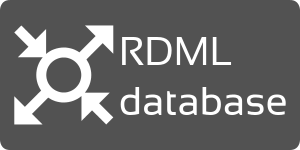Frequently asked questions
- Who owns RDMLdb? RDMLdb was developed by and is hosted by Ghent University. For more information, please contact us.
- How to search RDML files? Use one or more of the search fields to restrict you search. You can only use one keyword or ID per field. Searching can be done anonymously without the need to register or log in.
- How to cite or link to a record in RDMLdb? We suggest to write the following: 'The qPCR* / dPCR* data are available as RDML file in the RDMLdb database (http://rdmldb.org/index.php?ID=2006AA73**) (Ruijter et al., BMC Bioinformatics, 2015).' * select what is appropriate; ** replace ID with the ID of your RDML file
- When do you need to register on the RDMLdb website? Registration is not needed if you only want to search data. You have to register when you want to upload and archive RDML files on the RDMLdb website.
- How to upload data? You need to log in to the website and click on the upload RDML icon in the menu. You have to select an RDML file from your computer to upload it.
- Can I upload unpublished data and make it available to a restricted group of users: colleagues, co-authors, journal editors, or reviewers? Yes, you only have to fill in a date in the field ‘keep RDML file private until’ during the upload process. RDML files can only be kept private for a maximum of one year or until a manuscript describing the file, is published. You can always remove the end data after the data submission process.
A private RDML file will only be visible for the submitter after logging in or when a specific link is used.
E.g.: http://rdmldb.org/index.php?ID=2006AA72
The submitter will receive an email with this link which can be used to give anonymous and restricted access to the file.
